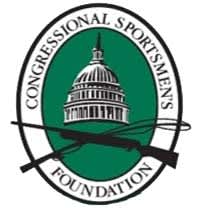Hunter and Angler Numbers Up: Expenditures Rival Some of America’s Biggest Companies
Congressional Sportsmen's Foundation 09.20.12

A coalition of hunting and angling groups and the outdoor industry briefed members of the Congressional Sportsmen’s Caucus yesterday on the rise in hunting and fishing participation in this country. The groups, led by the Congressional Sportsmen’s Foundation, Cabela’s, Safari Club International, National Shooting Sports Foundation, American Sportfishing Association and National Marine Manufacturers Association, used recently released data from the U.S. Fish and Wildlife Service’s (Service) 2011 National Survey on Fishing, Hunting and Wildlife Associated Recreation to compare hunting and fishing participation and expenditures to mainstream industries.
“To put it in perspective, the 37 million sportsmen and women over the age of 16 in America is the same as the population of the state of California, and the $90 billion they spent in 2011 is the same as the global sales of Apple’s iPad and iPhone in the same year,” commented Jeff Crane, president of the Congressional Sportsmen’s Foundation. “Hunting and fishing have been, and clearly continue to be, important elements of our country’s outdoor heritage and they are critically important to our nation’s economy – particularly the small local economies that support quality hunting and fishing opportunities.”
The participation and economic data, released in August by the Service shows a 9 percent increase in hunters and an 11 percent increase in anglers compared to the 2006 survey. The important thing to note is that these numbers are just accounting for sportsmen and women age 16 and older so actual participation is likely higher when adding in youth. Most notable, however, is that hunters and anglers continued their strong spending habits. From equipment expenditures ($8.2 billion for hunters, $6.2 billion for anglers) to special equipment ($25 billion towards boats, RV’s, ATV’s and other such vehicles) to trip-related expenses totaling over $32 billion, sportsmen and women continue to direct their discretionary income toward their outdoor pursuits.
“The economic impact of hunting and fishing is profound in South Dakota and across the country,” noted Senator John Thune (SD), Republican Senate Co-Chair of the Congressional Sportsmen’s Caucus, at the briefing. “It’s important that we have policies that promote hunting and fishing and support the outdoor industries.”
“People don’t think about hunting and fishing in terms of economic growth,” stated Senator Jon Tester (Montana), Democratic Senate Co-Chair of the CSC, to the participants. “The statistics in the new economic impact report are great and will go a long way to telling the public just how important hunting and fishing are in this country.”
“One of the statistics I learned today is that the $6 billion that hunters spent in 2011 on guns, ammunition and archery equipment is comparable to the sales of bicycles in the United States. This is particularly important because most of those gun and ammunition companies are based right here in this country meaning sportsmen’s dollars support American jobs and American workers,” said Representative Bob Latta (OH), Republican House Vice-Chair of the Congressional Sportsmen’s Caucus.
“In today’s world, we are talking about economics and jobs – those are the main drivers in most policy discussions. It is so important to see how strong the sportsmen’s community is and what they are doing to support the American economy so they have a voice in those discussions,” commented Senator Jim Risch (ID), Republican Senate Vice Chair of the Congressional Sportsmen’s Caucus.
Beyond the impact to businesses and local economies, sportsmen and women have played an essential and unmatched role in conserving fish and wildlife and their habitats. Sportsmen and women are the nation’s most ardent conservationists, putting money toward state fish and wildlife management. When you combine license and stamp fees, excise taxes on hunting and fishing equipment, the tax from small engine fuel and membership contributions to conservation organizations, hunters and anglers directed $3 billion towards on-the-ground conservation and restoration efforts in 2011 – that is over $95 every second. This does not include their own habitat acquisition and restoration work for lands owned or leased for the purpose of hunting and fishing, which would add another $11 billion to the mix.
The comparisons released during Wednesday’s congressional briefing are the beginning of what will include more detailed economic and participation data and comparisons to more industries. A full report that will include state-by-state information will be released in late November.

